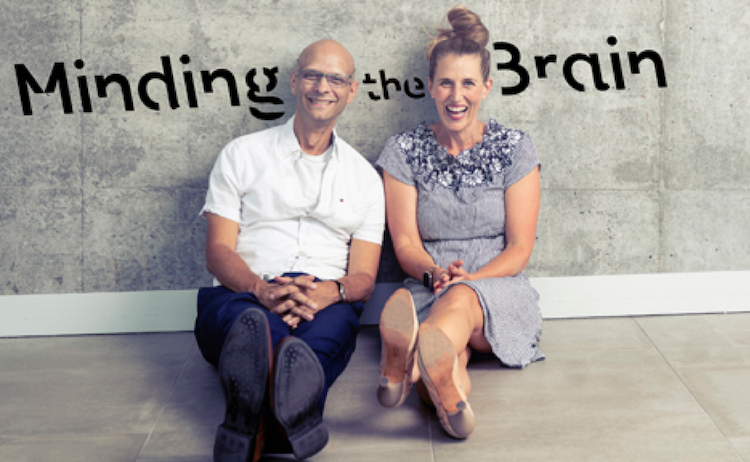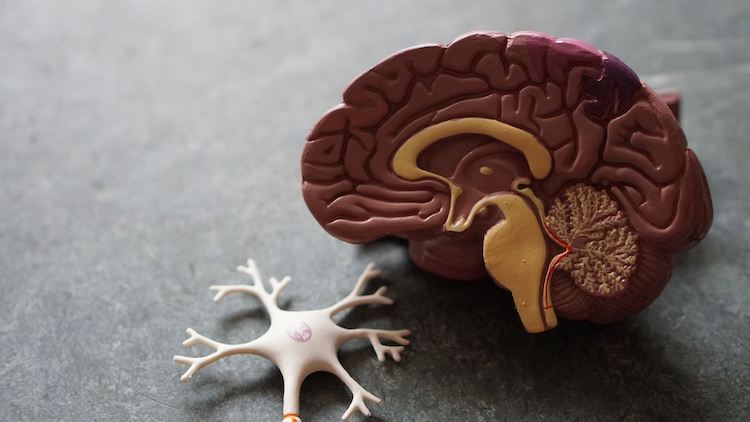Maria Giammarco, Science in Society Editor
Can people really multitask? How do our brains imagine the future? Why do we get so fired up about sports games?

The Minding the Brain, by Dr. Jim Davies and Dr. Kim Hellemans, was voted the 2019 Favourite Science Site winner, an annual competition hosted by Science Writers and Communicators Canada and Science Borealis.
With topics like these under their belt, this year’s Favourite Science Site win is a no-brainer. Minding the Brain, a podcast created and hosted by Dr. Kim Hellemans and Dr. Jim Davies, brings deep yet accessible understanding to complex and varied questions about the mind and brain. The show uniquely combines evidence and ideas from neuroscience, psychology, cognitive science, and philosophy – and in this, fills a gap in the science podcast landscape.
Minding the Brain reflects Hellemans’s and Davies’s shared passion for teaching, science outreach, and all things mind and brain. So how did it all begin? Appropriately, with a student project. Hellemans wanted something different to come from one of her students’ independent study courses – something more imaginative and impactful than your typical term paper. Playing to the students’ past experiences in the world of podcasts, the idea for a brain science podcast was born.

Photo by neil godding on Unsplash
But the Minding the Brain story goes back even further. Hellemans and Davies are long-time teaching colleagues. In fact, this is not the first scicomm project they’ve worked on together. One day, after Davies sat in on one of Helleman’s neuroscience classes, the idea for a teaching app on action potentials – basically how neurons, the building blocks of the brain, work – came to him. And so marked one of their first collaborations. Fast forward to Hellemans sharing the story of her student’s podcast; the project foundations combined with Davies’s long-standing interest in starting a podcast made Minding the Brain the natural next step.
Minding the Brain’s origin story highlights how Hellemans and Davies embody science communication in all parts of their professional lives. And the podcast is but one example of their commitment to education and outreach. In a world where many of us can access endless information at our fingertips, what role is there for scicomm? Our winners argue, rightfully, still a big one. In fact, perhaps more now than ever. Sure, we can find information about any scientific topic or field of study – but what does that information mean? Does information equal knowledge, understanding? How can we sift through the nuances and think critically enough to make sense of it all?
“I’m very very passionate about people who go on the internet…read stuff, think that they’re experts in something and have an opinion. Just because they’ve read information. And the way I say it is that’s the equivalent of me reading a textbook on cardiovascular surgery and then waltzing into an OR and thinking that I can do it.”
– Dr. Kim Hellemans
In an information rich age, we run the risk of being critical thinking poor. And this is a big part of why the podcast is so important to them – especially for the complex and often misunderstood realm of brain science. As they note, translating science for the public is critical – but scientists haven’t generally done a good job of this.
Minding the Brain is Jim and Kim’s way of helping people better understand the science of the mind and brain – to…
“teach people not only about how minds work but also try to reinforce the idea that there is a science to it at all.”
– Dr. Jim Davies
They appreciate the role that good science communication plays in being a trusted source of accurate information that also engages audiences in critical thought.
“So that’s one thing I think is great about it – if you have a source that you sort of trust…and we hope that with the podcast we’ve built that trust.”
– Dr. Kim Hellemans
But talking about science to the public is difficult. Talking about neuroscience and cognitive science in a podcast can be especially challenging given that so much of the learnings are visual in nature – from complex data to literal representations of how brain areas work and connect.

Photo by Robina Weermeijer on Unsplash
So what makes Minding the Brain work? For one, the podcast’s multidisciplinary approach: by blending neuroscience with not only a psychology or cognitive science angle, but a philosophical angle too, the podcast doesn’t just share information about the brain, it provides a critical lens on that information. We learn about not only the physical brain and how it works, but the mental capacities and experiences that it gives rise to.
Minding the Brain also strikes that difficult balance between making information accessible and engaging, without oversimplifying content or making it gimmicky. These are complicated topics – and we shouldn’t deny that. Minding the Brain acknowledges that brain science is complex but communicates complex and scientifically accurate content in a casual, conversational way. Helleman and Davies’s friendship and recognized histories as educators goes a long way in rounding out the engaging nature of the podcast. Their unique voices and unique perspectives on the mind and brain just make sense. As they say: “the magic is in the conversation.”
Dr. Hellemans is an award-winning university instructor, neuroscientist, and Chair of Neuroscience at Carleton University. Her science story starts with her interest in understanding the causes of addiction. In addition to Minding the Brain and her Post Synaptic Simulator app with Dr. Davies, she helps her students run a campaign that aims to decrease stigmas associated with mental health and substance use and runs workshops on addiction stigma with the Canadian Centre on Substance Use and Addiction. Her favourite Minding the Brain episode is “#15: Multitasking.”
Dr. Davies is an award-winning scientist, artist, playwright, and author. He runs the Science of Imagination Lab at the Institute of Cognitive Science at Carleton University – the only Cognitive Science department in Canada. He is a long-time member of Science Writers and Communicators of Canada and as a lover of science communication, produces content on how the mind works for a variety of media outlets. His favourite Minding the Brain episode is “#5: Concussions.”
They are both always happy to take episode ideas from their listeners.
~30~
People’s Choice Awards: Canada’s Favourite Science Site is sponsored by Science Borealis and the Science Writers and Communicators of Canada, and celebrates excellence in online science communication. Be sure to check out this profile of the winner of the People’s Choice Awards: Canada’s Favourite Science Blog.




nice! thank you so much and I agree with the science site!